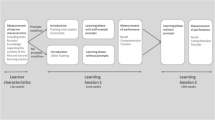Abstract
Software scaffolding has been successfully employed within educational technology to help bridge the recognition-production gap between what learners want to achieve and what they are able to effect themselves without assistance. Such work has however concentrated on scaffolding the learner at the domain level with less attention to the potential for providing explicit support at the Metacognitive level. Evidence from previous work has shown that less able and less knowledgeable learners are especially ineffective at selecting appropriately challenging tasks and seeking appropriate qualities and quantities of support and guidance [1, 2]. But how can we make learners more effective at reflecting on their own needs, at seeking appropriate challenges and appropriate support? We have used a participatory design approach to assist young learners in the design process so that they can, in turn, assist us as we develop Metacognitive scaffolding strategies. These strategies have been implemented in Ecolab II. Early results are encouraging and suggest that low ability children can too be scaffolded to greater success.
Access this chapter
Tax calculation will be finalised at checkout
Purchases are for personal use only
Preview
Unable to display preview. Download preview PDF.
Similar content being viewed by others
References
Luckin, R. and B. du Boulay, Ecolab: the Development and Evaluation of a Vygotskian Design Framework. International Journal of Artificial Intelligence and Education, 1999. 10(2): p. 198–220.
Wood, H.A. and D. Wood, Help seeking, learning and contingent tutoring. Computers and Education, 1999. 33(2-3): p. 153–169.
Vygotsky, L.S., Mind in society: the development of higher psychological processes. 1978, Cambridge, MA: Harvard University press.
Vygotsky, L.S., Thought and Language. 1986, Cambridge, Mass: The MIT Press.
Wood, D.J., J.S. Bruner, and G. Ross, The role of tutoring in problem solving. Journal of Child Psychology and Psychiatry, 1976. 17(2): p. 89–100.
Soloway, E., et al., Learning theory in practice: Case studies of learner-centred design, in CHI 96 Human Factors in Computing Systems: Common Ground, M.J. Tauber, Editor. 1996, ACM press: Vancouver. p. 189–196.
Wood, D., et al., EXPLAIN: Experiments in planning and instruction. Society for the Study of Artificial Intelligence and Simulation of Behaviour Quarterly Newsletter, 1992. 81: p. 13–16.
Rosson, M.B. and J.M. Carroll, Scaffolded examples for learning object-oriented design. Communications of the ACM, 1996. 39(4): p. 46–47.
Bliss, J., Askew, M. & Macrae, S., Effective teaching and learning: scaffolding revisited. Oxford Review of Education, 1996. 22(1): p. 37–61.
Jackson, S.L., J. Krajcik, and E. Soloway, The Design of Guided Learner-Adaptable Scaffolding in Interactive Learning Environments. CHI 98 Human Factors in Computing Systems, 1998: p. 187–194.
Luckin, R.,’ ECOLAB’: Explorations in the Zone of Proximal Development. 1998, School of Cognitive and Computing Sciences, University of Sussex.
Wood, D.J., Wood, H. A. & Middleton, D. J., An experimental evaluation of four face-to-face teaching strategies. International Journal of Behavioural Development, 1978. 1: p. 131–147.
Goldstein, P., The genetic graph: a representation for the evolution of procedural knowledge, in Intelligent Tutoring Systems, D. Sleeman and J.S. Brown, Editors. 1982, Academic Press: New York.
Flavell, J.H., Metacognition and cognitive monitoring: A new area of cognitive-developmental inquiry. American Psychologist, 1979. 34: p. 906–911.
Brown, A.L., Metacognition, executive control, self-regulation, and other more mysterious mechanisms., in Metacognition, motivation, and understanding, F. E. Weinert and R.H. Kluwe, Editors. 1987, Lawrence Erlbaum Associates.: Hillsdale, New Jersey:. p. 65–116.
Dahlback, N., A. Jonasson, and L. Ahrenberg, Wizard of Oz studies: Why and How? Knowledge Based Systems, 1993. 6: p. 258–266.
Luckin, R. and L. Hammerton. „OK, I’ll have someone help me for a change“Talking to children about task difficulty and help seeking to inform software scaffolding design. in International Conference on Communication, Problem-solving and Learning. 2001. University of Strathclyde, Scotland.
Hammerton, L. and R. Luckin, You be the Computer and I’ll be the Learner: Using the ‘Wizard of Oz’ Technique to Involve Children in the Software Design Process, in Proceedings of 10th International Conference on Artificial Intelligence in Education: AIED in the Wired and Wireless Future., J. Moore, W.L. Johnson, and C.L. Redfield, Editors. 2001, IOS Press: Amsterdam. p. 551–553.
Hammerton, L. and R. Luckin, How to help? Investigating children’s opinions on help: To inform the design of Metacognitive Software Scaffolding, in AIED2001 Workshop Proceedings: Help provision and help seeking in Interactive Learning Environments., R. Luckin, Editor. 2001, St Mary’s University: San Antonio. p. 22–33.
Luckin, R., Knowledge construction in the zone of collaboration: scaffolding the learner to productive interactivity, in International Conference of the Learning Sciences, A. Bruckman, et al., Editors. 1998, AACE: Atlanta, Georgia. p. 188–194.
Author information
Authors and Affiliations
Editor information
Editors and Affiliations
Rights and permissions
Copyright information
© 2002 Springer-Verlag Berlin Heidelberg
About this paper
Cite this paper
Luckin, R., Hammerton, L. (2002). Getting to Know Me: Helping Learners Understand Their Own Learning Needs through Metacognitive Scaffolding. In: Cerri, S.A., Gouardères, G., Paraguaçu, F. (eds) Intelligent Tutoring Systems. ITS 2002. Lecture Notes in Computer Science, vol 2363. Springer, Berlin, Heidelberg. https://doi.org/10.1007/3-540-47987-2_76
Download citation
DOI: https://doi.org/10.1007/3-540-47987-2_76
Published:
Publisher Name: Springer, Berlin, Heidelberg
Print ISBN: 978-3-540-43750-5
Online ISBN: 978-3-540-47987-1
eBook Packages: Springer Book Archive




